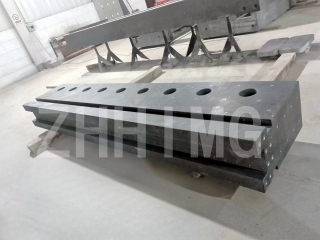Black Granite Guideways are one of the most common types of linear motion components used in precision engineering applications such as metrology, machine tools, and coordinate measuring machines. These guideways are made of solid black granite material, which is known for its exceptional hardness, durability and wear resistance. However, like any other product, black granite guideways are not immune to defects and issues, which can affect their performance and lifespan. In this article, we'll outline some of the common defects of black granite guideways and provide solutions to address them.
1. Surface Roughness
One of the most common defects of black granite guideways is surface roughness. When the surface of the guideway is not smooth, it can create friction and lead to increased wear and tear, reducing the lifespan of the guideway. This issue can be caused by several factors such as improper machining methods, lack of coolant during machining, or the use of worn-out grinding wheels.
To address this issue, the machining process should be done with high precision to ensure that the surface is smooth. The use of coolant or lubricant during machining can also highly affect the smoothness of the surface. It is also necessary to use high-quality grinding wheels, which should be checked and replaced regularly to prevent their wear-out. By doing this, the surface of the black granite guideway will not only reduce friction but will also increase its lifespan.
2. Surface Deformation
Surface deformation is another common defect that affects black granite guideways. This defect can occur in different ways, such as temperature variations, mechanical deformation, and improper handling. Temperature changes, such as cold and heat, can cause the material to expand or contract, leading to surface deformation. Mechanical deformation can occur due to improper handling, transportation, or installation. Due to its heavy weight, granite can easily crack or break if not handled with utmost care.
To prevent surface deformation, it is recommended to store the guideways in a dry and stable environment, avoiding dew, high humidity, or extreme heat or cold. Transportation and installation should also be done under strict guidance, ensuring that the guideways are not subjected to mechanical deformation. Proper handling is also important when installing the machine, to avoid any damage to the guideway or other components.
3. Chip and Crack
Chips and cracks are defects that commonly occur in black granite guideways. These defects are caused by the presence of air in the granite material, which expands and causes the material to crack as the temperature changes. Sometimes, guideways made with low-quality granite or cheap manufacturing methods can also be prone to chipping and cracking.
To prevent chip and crack formation, high-quality granite materials should be used during manufacturing, and their quality checked before machining. During handling and installation, it is essential to avoid any impact to the material, as this can cause chips or cracks. Care should be taken when cleaning the guideways to avoid using abrasive materials that can cause damage.
4. Lack of Flatness
The lack of flatness is another defect that can be encountered in black granite guideways. This defect occurs due to twisting or bending of the granite during manufacturing or handling. The lack of flatness is a significant concern since it can highly affect the precision of the components that are mounted on the guideway.
To address this defect, it is important to manufacture the guideway with high quality and precise machining, so to avoid any twist or bending. It is highly recommended to check the guideway's flatness frequently to detect any deviation from the specification. Any deviation from flatness can be corrected by re-calibrating the machine and adjusting the surface to bring it back to its original flatness.
In conclusion, black granite guideways are not free from defects, but they can be easily prevented or addressed with the right preventative measures and care. The use of high-quality materials, precision machining, proper handling and storage, and frequent checking of the surface flatness, can ensure the proper functioning of the guideway and increase its lifespan. By doing these things, black granite guideways will continue to be essential components in precision engineering applications where a high level of accuracy is required.
Post time: Jan-30-2024

